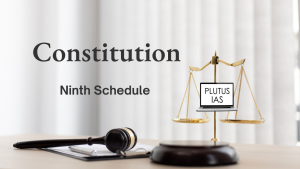16 Nov Ninth Schedule
Ninth Schedule
Details on the topic “Ninth Schedule”
Relevance for Prelims: Reservation, First Amendment Act
Relevance for Mains: Ninth Schedule of Indian Constitution
Context: Recently Jharkhand Assembly has cleared 2 bills that raises the reservations up to 77% which will come into force when the Centre carries out amendments to include them in it.

Pic: Ninth Schedule (Constitution of India)
About Ninth Schedule:
- It consists of a range of central and state laws which cannot be challenged in courts and was added by the Constitution (1st Amendment) Act, 1951.
- The First Amendment added thirteen laws to the schedule. Currently, the number of protected laws stands at 284.
- The schedule was created by new Article 31B which along with Article 31A was brought in by the government to protect laws related to agriculture reforms and abolishing of Zamindari System.
Need of Inclusion in Ninth Schedule:
- The 77% reservation breaches the 50% ceiling set up by the Supreme Court in the Indra Sawhney judgment in 1992.
- The Jharkhand Assembly has followed the practice of Tamil Nadu which has reserved 69% of seats in colleges and jobs in the state government for Other Backward Classes, Schedule Castes, and Scheduled Tribes.
- Placing legislation under Ninth Schedule shields it from judicial scrutiny.
Supreme Court position on 9th Schedule:
- Keshavananda Bharti v. State of Kerala (1973): The court introduced a concept of Basic Structure which stated amendments that abrogate or take away the essence or basic structure pf the constitution which included Fundamental Rights are fit to be struck down by the court.
- Waman Rao Case (1981): Amendments made in the constitution before April, 1973 are valid and constitutional but those amendments which were made after the said date are open to challenge on grounds of constitutionality.
- IR Coelho case (2007): Any act can be challenged and open to scrutiny by the judiciary if it is not in consonance with the basic structure of the constitution. In addition, the court observed that if the constitutional validity of any law under the 9th Schedule of constitution has been upheld before, it cannot be challenged again.
UPSC Previous Year Prelims Questions:
Q1. Consider the following statements: (2018)
- The Parliament of India can place a particular law in the Ninth Schedule of the Constitution of India.
- The validity of a law placed in the 9th Schedule cannot be examined by any court and no judgment can be made on it.
Which of the statements given above is/are correct?
(a) 1 only
(b) 2 only
(c) Both 1 and 2
(d) Neither 1 nor 2
Q2. The Ninth Schedule was introduced in the Constitution of India during the prime ministership of (2019)
(a) Jawaharlal Nehru
(b) Lal Bahadur Shastri
(c) Indira Gandhi
(d) Morarji Desai
Mains UPSC PYQ
Q1- What was held in the Coelho case? In this context, can you say that judicial review is of key importance amongst the basic features of the Constitution? (2016)
Current Affairs for UPSC
Are you looking for the latest Daily Current Affairs for UPSC? Plutus IAS provides you with updated and latest Current Affairs for UPSC examination. The topic described above is related to Indian polity and Governance. Nowadays it is very important for any UPSC aspirant to reading Current Affairs for UPSC examination. That is why Current Affairs are part and parcel of any competitive examination. So everybody should accustom to reading Today Current Affairs for UPSC examination.
Source:



No Comments